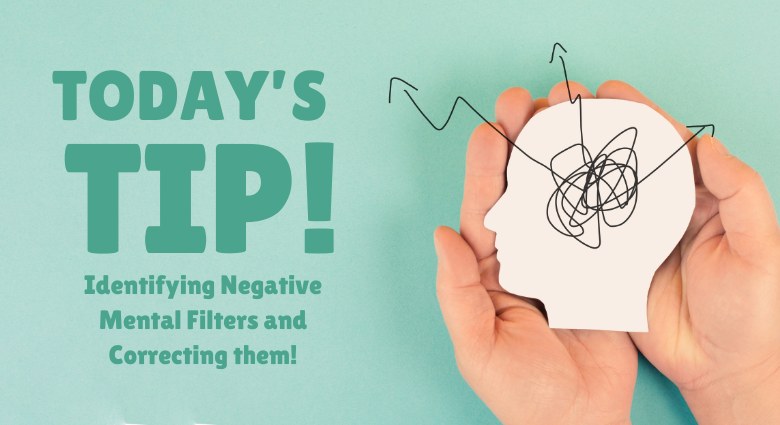
Negative thinking has consequences. While it does not prepare you for life events or ward off malicious mojo, it may increase the risk of face furrows and wrinkles, work addiction and Alzheimer’s.
Many of us unknowingly engage in cognitive distortions – including mental filtering, a biased way of thinking about ourselves or the world around us. The core issue lies within the troubling emotional states and behaviours that may be yielded by these irrational thoughts and beliefs, including anxiety, depression and interpersonal conflicts.
Negative mental filters
There are myriad mental filters and other cognitive distortions that we use within our daily lives. Here are 15 that could directly inhibit your joys and successes:
1. Negative predicting
This mental filter involves foretelling the future in a negative light. There are typically just as many reasons something can go right. Assuming you will nervously botch an upcoming presentation is just a thought steeped in pessimism. Channel that nervous energy into poise and confidence.
2. Unrelenting standards
This is the mindset that extremely high standards are required to avoid calamity. Perfectionism not only has the potential to harm our productivity, it may be linked with procrastination. So, try to remember that the question is not, “Does anal retentive have a hyphen?” The question is, “Does it matter?”
3. Black and white thinking
It allows no middle ground or shades of gray. It’s a “nothing succeeds like excess” sort of mental filter. Such polarized thinking fails to recognize that there are usually other reasonable options. If you insist on all or nothing, you may just end up with nothing.
4. Self-serving bias
Do you prioritize being right over the facts or the feelings of others? The self-serving bias mental filter causes us to attribute our successes to ourselves and our failures to external factors and/or people.
5. Fallacy of fairness distortion
This mental filter assumes that things have to be measured based on fairness and equality, when in reality things often don’t work that way. Life isn’t fair for everyone, so doesn’t that make life fair?
6. Underestimating your ability to handle negative events
What doesn’t kill you gives you coping mechanisms and a dark sense of humour.
7. Entitlement
This mental filter creates the belief that the same rules that apply to others should not apply to you—that you deserve more or better than those around you. You can’t spell “entitlement” without “i” and “me.” But imagine a world where a sense of service and gratitude replaced entitlement and expectation.
8. Repeating the same behaviour hoping for different results
This is unlikely to lead to success. For example, expecting that if you keep nagging your direct reports they will meet deadlines, even though you haven’t yet managed to obtain that result.
9. Personalization
This mental filter is a thought distortion in which you place the entirety of the blame for a situation on yourself. While you may have played a part, remember that other people and/or factors likely had a hand in it too, so try to consider what part you actually played. You can’t control everything, and you can’t please everyone. You’re not pizza.
10. Blaming
This is the opposite of personalizing, but a lot more satisfying. Blaming is a mental filter wherein you hold other people or circumstances responsible for your adversities.
11. Overthinking
This mental filter is a mindset that worry and rumination will lead to solutions. Worrying about a problem can actually impair our problem-solving ability—after all, if you question the answers too many times, you will never answer the questions.
12. Failure to chill
According to a report by Qualtrics, just “27% of employees used all their paid vacation time in 2021.” Taking the time to revitalize improves mental health and well-being while benefiting cognitive functioning and creativity. You need more than just restroom breaks.
13. Doubling down on a failed strategy hoping it will eventually yield positive results
Long ago, Kenny Rogers taught us, “You got to know when to hold ’em, know when to fold ’em.” There is a fine line between genius and insanity. Don’t erase that line.
14. Catastrophizing
This mental filter is being extremely well educated about all the things that could go wrong while always expecting the worst. A person who is catastrophizing might lose a sale and instantly think they will be fired and have to go live in a van eating ramen and regret.
15. “I can’t change my way of thinking.”
Rather than convincing yourself that changing mental filters is too hard, aim for small reductions in your negative automatic thoughts—just 10%, for example. You can still see the glass as half-full. Just not half-full of poison.
How to change negative mental filters
Thought patterns and mental filters change through a process called cognitive restructuring or reframing. By adjusting your thought patterns, you can begin to reframe and overcome negative thinking and cognitive distortions.
Identify your automatic negative mental filters (cognitive distortions).
Create a list of your troublesome thoughts. An examination of your cognitive distortions may allow you to recognize which distortions you favour.
What—if any—evidence is there to support those mental filters?
Try to identify the basis for your distorted thoughts, and then challenge them. What evidence do you truly have to support these beliefs? There are likely far more instances where you achieved success and things went well.
Ask peers to review your identified mental filters.
Seek the opinions of others about whether your thoughts and outlooks are accurate. If you truly believe that your colleagues have it in for you, refer to a few trusted peers for objectivity.
Find the shades of gray in your mental filters.
Rather than thinking about your situation through a black and white lens, assess things on a scale of 0 to 100. Things not materialized can be seen as partial successes rather than failures. Those partial victories are the savoury gradations. – Success Magazine
Leave a Reply
You must be logged in to post a comment.